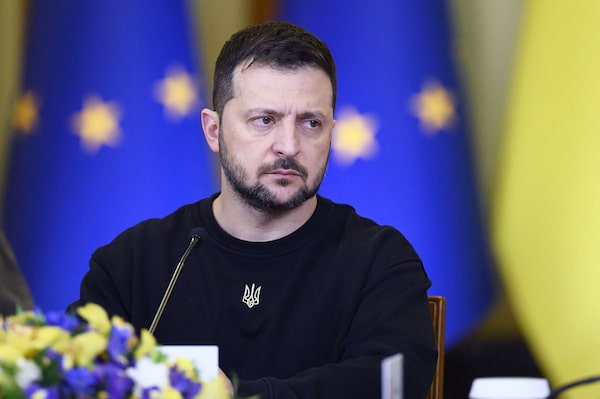
Ukrainian President Volodymyr Zelensky attends a meeting with the Moldovan president and the European Council president, in downtown Kyiv, Ukraine on Nov. 21.-/AFP/Getty Images
U.S. Defence Secretary Lloyd Austin made a surprise trip to Ukraine this week to tell that country and the world that the United States has not forgotten about the war that still rages there. Mr. Austin tried his best to reassure President Volodymyr Zelensky that America still has his back. But with a critical military aid package for Ukraine facing major roadblocks in the U.S. Congress, and “Ukraine fatigue” setting in across the West, the U.S. defence chief’s words rang hollow.
Since Hamas’s Oct. 7 attack on Israel, the war in Ukraine has receded from front pages as the world’s attention is monopolized by the conflict in Gaza. Russia’s invasion of Ukraine and Hamas’s assault on Israel are related in more ways than one. Both have mobilized hardened U.S. enemies, including Iran and North Korea, in their efforts to annihilate Western allies and democratic states. But the Israeli-Palestinian conflict is sucking up all the geopolitical oxygen.
This is good news for Russian President Vladimir Putin and bad news for Mr. Zelensky. It is bad enough that Ukraine’s long-awaited counteroffensive aimed at retaking territory lost to Russia has yielded meagre gains. Mr. Zelensky’s once unassailable leadership is suddenly being questioned from within his own government’s ranks and even Poland, an unflinching Russian foe, has wavered in its support.
Not long ago, most Western leaders seemed to believe Mr. Zelensky’s claims that Ukraine would win its war against Russian aggression. Most also agreed that it had to. A failure to stop Mr. Putin in Ukraine would not only embolden him; it would send precisely the wrong signal to aggressors everywhere.
Now, Western patience is increasingly wearing thin as neither side in the war in Ukraine shows signs of gaining the upper hand. The prospect of a conflict that endures for years without producing a clear victory is having a chilling effect on U.S. politicians being asked to approve a US$61-billion aid package for Ukraine, on top of the US$44-billion already provided. Strong bipartisan support for Israel should ensure that U.S. military aid to that country wins congressional approval in the coming weeks. The fate of the Ukraine aid is far less certain.
Even worse for Mr. Zelensky, the likelihood that Donald Trump emerges as the 2024 Republican presidential nominee has created a sense of urgency among many foreign policy experts in Washington. Some are openly urging Mr. Zelensky to negotiate a ceasefire with Russia soon or risk having the U.S. rug pulled out from under him entirely if Mr. Trump, a self-confessed Putin admirer, wins the White House a year from now.
“The United States should begin consultations with Ukraine and its European partners on a strategy centred on Ukraine’s readiness to negotiate a ceasefire with Russia and to simultaneously switch its military emphasis from offence to defence,” former Council on Foreign Relations head Richard Haass and CFR senior fellow Charles Kupchan wrote last week in Foreign Affairs. “Kyiv would not give up on restoring territorial integrity or holding Russia economically and legally accountable for its aggression, but it would acknowledge that its near-term priorities need to shift from attempting to liberate more territory to defending and repairing the more than 80 per cent of the country that is still under its control.”
This is not the first time Mr. Haass and Mr. Kupchan have tried to nudge Russia and Ukraine to the negotiating table. NBC News reported in July that they were among a group of former high-ranking U.S. government officials who met with Russian Foreign Minister Sergey Lavrov in April “to feel out where there might be room for future negotiation, compromise and diplomacy over ending the war.” Their latest op-ed appears to have found an increasingly receptive audience in Washington, including from within U.S. President Joe Biden’s administration itself.
“The reality is that what began as a war of necessity for Ukraine – a fight for its very survival – has morphed into a war of choice, a fight to recapture Crimea and much of the Donbas,” Mr. Haass and Mr. Kupchan wrote. “It is not only an unwinnable war; it is also one that risks losing Western support over time.”
That argument appears to be in line with what many Western officials acknowledge in private, even if they do not say so in public. Mr. Zelensky is clearly getting worried. “The world is not focused on the situation on our battlefield in Ukraine, and this dividing focus [on Gaza] clearly doesn’t help,” he said last week during a visit to Kyiv by British Foreign Secretary David Cameron.
The stakes in Ukraine are still as high as they were on the day of the Russian invasion 21 months ago. But with signs of a stalemate becoming harder and harder to ignore, and the countdown to the 2024 U.S. presidential election now under way, Mr. Zelensky is suddenly looking very alone.